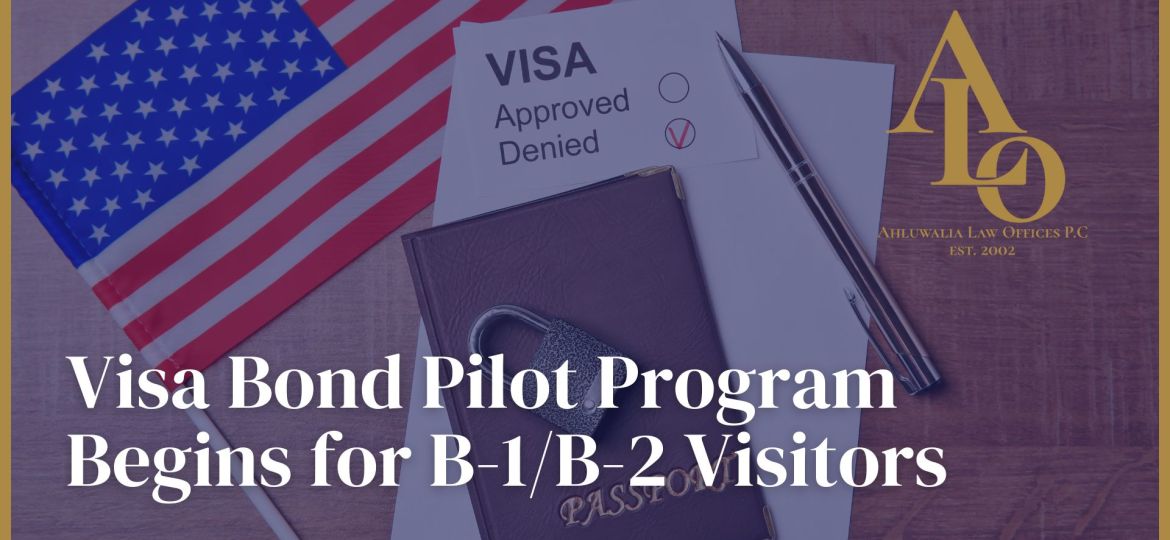
Effective August 20, 2025, the U.S. Department of State has launched a Visa Bond Pilot Program targeting select B-1 (business) and B-2 (tourist) visa applicants. This initiative, announced through a Temporary Final Rule (TFR), aims to address high overstay rates and inadequate foreign vetting by requiring visa applicants from certain countries to post a bond of up to $15,000 as a condition of visa issuance.
Who Is Affected?
Applicants applying for B-1/B-2 visas may be subject to this bond requirement if they are nationals of countries that:
- Have high visa overstay rates, based on the latest Department of Homeland Security (DHS) Overstay Report;
- Are deemed deficient in identity screening and vetting;
- Offer Citizenship by Investment (CBI) programs with no residency requirement.
The list of affected countries will be published and regularly updated at Travel.State.Gov at least 15 days prior to implementation in each case.
What Is the Visa Bond?
The bond—called a Maintenance of Status and Departure Bond—serves as a financial guarantee that the visa holder will comply with the conditions of their visa and leave the U.S. on time. Consular officers have discretion to set the bond amount at:
- $5,000
- $10,000
- $15,000
The default amount is $10,000 unless financial circumstances or immigration risk indicate otherwise. If the visa holder complies with the terms of their visa and departs the U.S. on time, the bond will be refunded in full. No interest will accrue on the bond amount.
How to Post the Bond
Once informed during their visa interview that a bond is required, applicants must:
- Pay the bond via Pay.Gov using Form I-352;
- Submit the payment within 30 days of notification;
- Receive an annotated visa valid for one single entry to the U.S. within three months of issuance.
Entry and exit must be through designated U.S. airports announced on Travel.State.Gov.
Why Is the Program Being Implemented?
The program is part of a broader U.S. strategy to strengthen immigration compliance and border security, under the direction of Executive Order 14159: Protecting the American People Against Invasion. DHS’s FY 2023 Overstay Report found over 500,000 suspected in-country overstays among nonimmigrant visitors.
According to the Department of State, the pilot will:
- Help assess whether visa bonds reduce overstay rates;
- Evaluate the operational feasibility of collecting and processing bonds;
- Serve as a diplomatic tool to pressure countries to improve their vetting and screening standards;
- Test inter-agency coordination between the State Department, Treasury, and DHS.
Will This Impact All B-1/B-2 Visa Applicants?
No. This program targets a limited group of nationals from countries identified as high-risk. Nationals of Canada, Mexico, and Visa Waiver Program (VWP) countries are excluded. The program will run for 12 months, ending August 5, 2026, with the possibility of policy changes thereafter based on the collected data.
What Happens After the Program?
Visa bonds posted during the program will remain active until:
- The applicant departs the U.S. on time, resulting in cancellation and refund of the bond; or
- A breach occurs (e.g., overstay or violation of visa terms), in which case the bond is forfeited.
Bond cancellation will be confirmed through DHS’s Arrival and Departure Information System (ADIS) or via direct documentation provided at a U.S. consulate.
What Should Foreign Nationals Do?
If you are planning to apply for a B-1/B-2 visa and are from a country that may be impacted:
- Monitor Travel.State.Gov for announcements about your country;
- Be prepared for a potential bond requirement;
- Maintain complete records of your travel and visa compliance.
If you are unsure whether this rule applies to you, or need assistance posting a bond or navigating consular procedures, consult with a licensed immigration attorney to protect your status and avoid any inadvertent violations.
Final Thought
This program marks a significant shift in how the U.S. enforces visa compliance. While it currently applies to a limited group, the operational findings may influence broader visa policy changes in the near future. Travelers and their families should stay informed and seek professional legal guidance to ensure continued compliance with U.S. immigration law.

